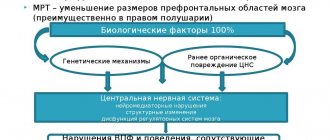Echolalia is the automatic repetition of other people's words, phrases, sentences, and even large parts of texts in speech.
In the process of individual development, there is a stage when echolalia in children is the norm - up to 2 years. At this age, the child actively imitates the behavior of adults (this is a mechanism of healthy mental development). From 6 to 9 months, one can also distinguish a period of normal autoecholalia - this is the time when the child himself repeats babbling syllables (ba-ba-ba, ma-ma-ma). Often parents mistake these autoecholalia for the first words.
If echolalia persists after 2-2.5 years, it is a symptom of a developmental disorder. And there is a stereotype that echolalia is a symptom of autism. This is wrong.
Echolalia can occur with various disorders (and even in adults, by the way):
- ZRR, ZPRR;
- Sensory alalia (dysphasia);
- Mental retardation;
- Schizophrenia;
- Autism spectrum disorder;
- Tourette's syndrome.
Echolalia occurs:
- Immediate
- Deferred.
Often, a child with delayed echolalia can perfectly insert phrases from cartoons and songs into the context of the situation. Good mechanical memory may be a kind of compensatory mechanism.
For me, as a specialist, a diagnosis is always of a secondary nature (especially since I do not make them; sometimes a diagnosis is a tribute to one or another administrative requirements of the system). It is much more important to understand the mechanism of the disorder, find out what and where “broke” and how the brain tries to get around it.
What is echolalia, echophrasia? Definition
Echolalia is characterized by spontaneous, compulsive, meaningless
uncontrolled person automatic repetition of sounds, syllables, words that are heard in the speech of other people. Moreover, even the intonation of the words heard can be preserved. The term echolalia comes from the Greek words “echo,” which means “reflection of sound,” and “lalia,” which means “speech,” or “laleo,” which means “speak.” In ancient Greek mythology, there was a nymph named Echo. She was petrified. All that was left of her was her voice. The voice repeated the endings of words that people uttered in her presence. A synonym is echophrasia .
Self-stimulating behavior
Delayed echolalia is sometimes a self-stimulating behavior whose sole purpose is the pleasure of the speaker. My eldest son always likes to repeat sentences he read in books. I realized that he sees the book in his head, and simply entertains himself by “rereading” his favorite passages over and over again. The line "George, what's that smell?" clearly borrowed from the book about the skunk "Curious George", which invariably causes homeric laughter.
He also enjoys repeating clips from his favorite videos as if he were watching them in his head. When delayed echolalia is used as personal entertainment, it can interfere with real communication. An adult can use such echolalia as a hint to gently switch the child to a more constructive activity.
When does echolalia occur?
In what pathological conditions, diseases, illnesses does echolalia occur? Echolalia can more often be observed in various neurological and mental diseases, such as Tourette's syndrome (Gilles de la Tourette's disease), autism (early childhood autism, autistic behavior, autism spectrum, autistic character traits), Andreas Rett syndrome, schizophrenia (catatonic), mental retardation (dementia, mental retardation, imbecility, debility), dysphasia, damage to the frontal lobes of the brain. Normally, echolalia occurs as a stage of speech development in children aged 6 months to 3 years, when the child repeats the words he hears, thus learning speech. If a child at 3 years of age and later repeats or shouts words, then this is a sign of a serious pathology. In this case, you should immediately consult a doctor.
Diagnostics
Long-term persistence of vocabulary and syllabic speech imitation in childhood or the appearance of this symptom in adults requires contacting a psychiatrist and neurologist. Echolalia is diagnosed during communication with the patient and observation of his speech. Typically, identifying automated repetitions of sentences and words is not difficult. To establish the nature of echolalic symptoms, a comprehensive examination is performed:
- Assessment of psychoneurological status.
Anamnesis collection, a clinical conversation, and a neurological examination allow doctors to assess the patient’s general condition: his ability to establish and maintain contact, navigate in space and time, and think critically about his illness. Neurological disorders and psychopathological symptoms accompanying echolalia are detected. - Speech therapy testing.
The speech therapist examines the speech function, determines the degree of its formation, the presence of pronunciation defects, and the loss of individual links. In conclusion, he notes whether echolalia is the result of speech underdevelopment or speech decay. - Pathopsychological testing.
A study of memory, thinking, attention and intelligence is carried out. The results indicate the presence or absence of signs of organic damage to the central nervous system, intellectual underdevelopment as the cause of echolalic manifestations. - Neuropsychological testing.
Diagnostics by a neuropsychologist is aimed at analyzing higher mental functions. Testing data allows us to determine neuropsychological symptoms (various types of alalia, aphasia) and differentiate neurological diseases.
Types of echolalia: immediate, delayed, true, mitigated
Reflexotherapists, neurologists, and psychiatrists distinguish 2 types of echolalia : immediate echolalia, delayed echolalia (delayed). In immediate echolalia, the child immediately repeats a word after hearing it from a person or any other sound source. With delayed echolalia, children repeat previously heard words after a long period of time. Several minutes or several years may pass after hearing the phrase. Delayed echolalia is common in Tourette syndrome and autism and is a feature of the disorder. True echolalia and mitigated echolalia are also distinguished. With true echolalia, automatic repetition of addressed speech occurs; with mitigated echolalia, the patient repeats words with transformation.
Potential risk of hysteria
It's a fairly common scenario in the autism community where the cause of a tantrum is a misunderstanding due to immediate echolalia. An adult asks a child: “Do you want grapes or apples?” The answer is almost always the last word: “Apples.” The adult decides that the child really wants apples. The child then begins to scream wildly when he is given an apple, because the child answered before he even realized the two options offered, and in fact he wanted grapes. Picture cards or PECS are a great way to offer your child options or prepare them for change, which can help prevent tantrums.
Causes of echolalia
When and why does echolalia occur? Echolalia in autism can fill a pause, express agreement or disagreement, name surrounding phenomena, people, objects, allows the child to calm down, train, understand someone else's speech, remember the past, share their feelings, have fun, share experiences and feelings. There are various causes of echolalia.
Child's self-stimulating behavior, stimming.
In this version, the child often repeats words read in books or heard on TV. In this case, the boy or girl has associations and emotions about the actions or objects they saw. Moreover, the appearance of images is not related to the current situation. This greatly interferes with the child's ability to communicate with other children or adults.
Communication of mood.
The child can express his mood, and this mood is often associated with a certain phrase that he remembered the day before. Moreover, the phrase may not be related in meaning to the mood that it expresses in the child.
Systematization of the day's results.
In young children, delayed echolalia may express idiosyncratic processing of information they have received throughout the day that keeps them from calming down.
Unfortunately, in older age, echolalia in most cases indicates a serious pathology, Tourette syndrome , autism, which must be treated in a timely manner.
Prevention
Echolalia is a unique form of communication, that is, it cannot be called a meaningless and aimless repetition of someone else’s words. Prevention of the disease is aimed at normalizing the communication process, turning the disorder into a tool for interaction with others. Do not stop the patient when repeating, since pronouncing words is one of the ways of self-expression in case of problems with oral speech. If this opportunity is not available, the patient will not be able to practice pronunciation, maintain a conversation, and minimize anxiety through verbal communication. Pay attention to all the words spoken, even if they don’t make sense at first glance. This will allow you to study the features of echolalia in more detail and improve the communication process. Try to understand what is being said, intonation and facial expressions of the patient. It is very important to grasp the tone and rhythm of what is said, since the same phrases can convey different information. Join the conversation and recite your child’s favorite speech scripts one by one. Try to form new things, that is, expand the phrases you have memorized, constantly expanding your vocabulary. Only regular exercises in a calm environment will help to establish the communication process and improve the socialization of the patient. [50], [51]
Treatment of echolalia in children and adults in Saratov
Sarklinik (Russia, Saratov) successfully uses hardware and non-hardware methods for treating echolalia in children, adolescents and adults in Saratov. Treatment is carried out on an outpatient basis in courses. The minimum duration of one course of treatment is 10 working days. The total number of courses depends on the severity of the pathology. Sarklinik knows how to treat echolalia in boys and girls, how to get rid of echolalia in boys and girls, what to do with echolalia in men and women.
Sarklinik also provides treatment for delayed speech development, treatment for delayed psycho-speech development, general speech underdevelopment (GSD), treatment for mental retardation, mental retardation, treatment of alalia, dyslalia, and autism in children.
Sign up for consultation There are contraindications. Specialist consultation is required.
When using article materials, an active link to sarclinic.ru is required. Text: ® SARCLINIC | Sarclinic.com \ Sarсlinic.ru Photo: © davetroesh / Photobank Photogenica / photogenica.ru The people depicted in the photo are models, do not suffer from the diseases described and/or all coincidences are excluded.
Related posts:
Tics, nervous tics, treatment, hyperkinesis, hyperkinesis treatment
Cerebral palsy in children, children with cerebral palsy, treatment
Alalia for children, alalia treatment, motor, sensory, sensorimotor
Speech aphasia in children, afrasia in children and adults
Intracranial hypertension syndrome, liquorodynamic disorders
Comments ()
About the disease
Childhood echolalia is a deviation in the formation of speech, in which the child uncontrollably repeats words and expressions from the speech of other people.
Sometimes several times. At the same time, he may not even understand the meaning of what is said.
This phenomenon is typical for a child between one and two years old , when he is just learning to speak and repeats words and phrases after others.
Also, children 3-4 years old often copy the behavior of adults, including in speech. This is also considered a variant of the norm. In this way, the child acquires communication skills.
If echolalia does not go away after 4 years, then this is already considered a deviation and requires correction.
Often the disease is combined with echopraxia (repetition of gestures and facial expressions). The incidence of pathology does not exceed 0.5%.
Such children experience difficulties in social adaptation and the inability to study in a comprehensive school. The most difficult situation is for patients whose echolalia is combined with mental retardation .
Complications and consequences
Echolalia is a serious disorder that, if left untreated, can lead to problems in adulthood . The child cannot communicate with peers, make friends, or study in a regular school.
Later, patients experience difficulties in finding a job and establishing personal relationships. They usually live alone, and many need parental help throughout their lives.
In addition, the patient’s other disorders progress :
- Delayed speech development.
- Insufficient development of cognitive skills (memory, attention, thinking).
- Lag in emotional development.










